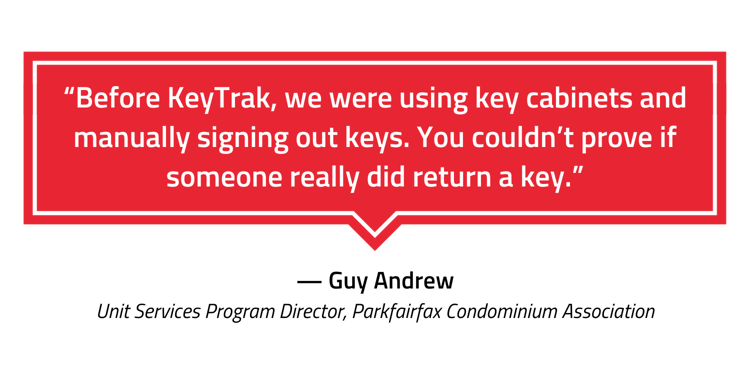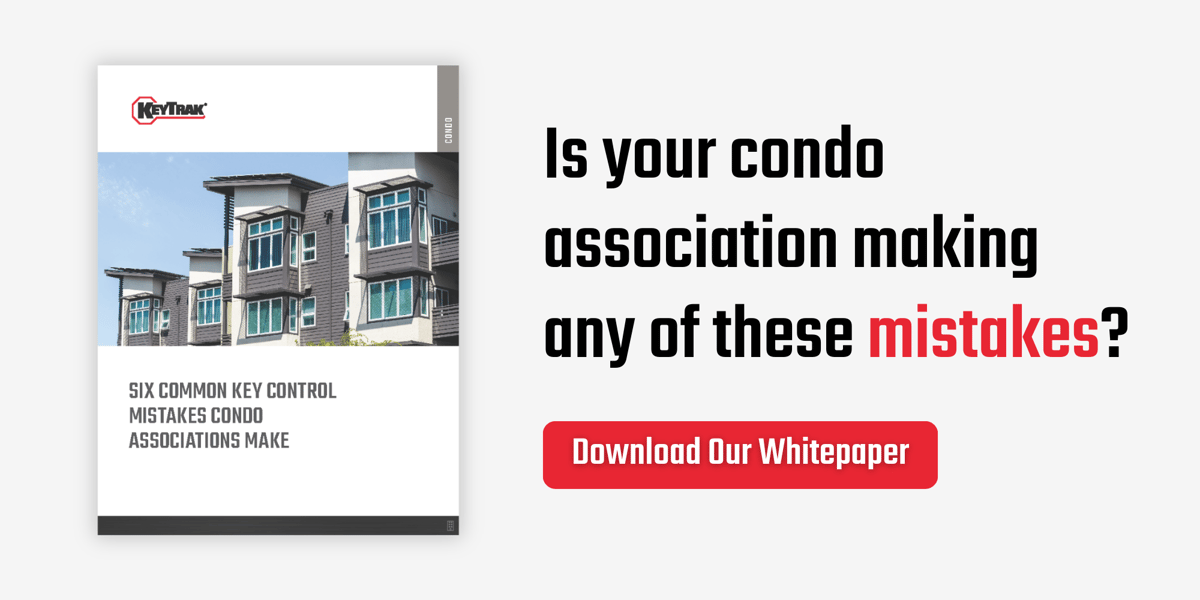Residents have negative perceptions of HOAs and boards — and there have been enough security incidents in recent years to justify their concerns. If you serve on a condo board, what can you do to keep your association running smoothly while protecting residents? In this post, we’ll highlight five news stories that provide valuable security and accountability lessons for condominium boards. Learn from the scenarios in this post and take steps to prevent them from happening in your community.
Food Delivery Driver Steals Master Key
A resident of a large condo building was shocked to discover one day that their car had been stolen from the parking garage. When the resident went downstairs to search for the vehicle, they discovered packages strewn around the floor in the package room.
Security camera footage and a conversation with the concierge revealed that the culprit was a food delivery driver. Once admitted to the building, the thief broke into the building office and stole a staff master key, which provided access to the front entry, package room, parking garage, and all the floors of the nine-story building. After entering the resident’s unit and stealing a bag containing a laptop and car keys, he looted the package room and used the resident’s car to get away with the stolen items.
Lessons Learned
This brazen theft exposed the flaws in the association’s security infrastructure. Despite having fobbed entry points, surveillance cameras, and a concierge, the thief was still able to locate and remove a master key. To avoid a similar incident in your community, review your security protocol and implement key control measures to keep master keys out of the wrong hands.

Condo Development Loses $339,000 to Embezzlement
Homeowners in a Hawaii condo development were victim to one of the largest embezzlement cases in the state, resulting in a staggering loss of over $339,000. The board of directors issued a letter about the incident, which involved unauthorized payment of fraudulent vendor invoices for work that hadn’t been performed. The scheme went on for two years before being discovered in a state-required financial audit. The losses had gone unnoticed in previous audits, but a few individual owners noticed the financial irregularities and pushed for further investigation.
After the theft, the property management company reimbursed residents and stopped providing services to the community. The suspects weren’t publicly identified, but an attorney specializing in condominium and community association law indicated that it wouldn’t be difficult for a property manager or other staff member to process phony invoices.
Lessons Learned
This case is a stark reminder of the importance of stringent checks and balances. Implement technology and processes to hold property managers and vendors accountable for handling sensitive assets, whether it’s money or keys.
Thief Steals Mail From Locked Condo Mailroom
Surveillance footage captured a man entering a Chicago condo building without authorization. Once inside, he used a universal key to open all the mail compartments and stuffed mail down his pants. Only residents with a key can enter the building, raising concerns about how the man was able to gain access. One of the residents noted that a rattling sound in the video footage seemed to indicate that the thief had multiple keys.
Lessons Learned
This incident underscores the importance of collaboration between residents, property management, and law enforcement to address and prevent crime. Consider running regular security awareness campaigns to empower residents to be vigilant against theft and contribute to the overall safety of the community.
Mail Theft Escalates to Break-ins
What started as mail theft at a Seattle condo building progressed to potential break-ins as thieves became more bold. They started by prying open the fire escape door, giving them access to resident mailboxes. They then moved on to breaking into residents’ vehicles and storage units before attempting to break into lock boxes containing keys to the entire building. One woman expressed fear that the building’s 54 condo owners were “sitting ducks” waiting to be injured or killed.
The local police department released a statement indicating that because of staffing issues, law enforcement had to prioritize violent crimes over property crimes. As a result, they didn’t have officers available to investigate the thefts.
Lessons Learned
Certain security risks, like the rise of mail theft and law enforcement staffing shortages, are beyond a condo board’s control. That’s why it’s especially important to focus on crime prevention measures you can control, such as securing building keys in a tamper-proof electronic key control system. In addition, regularly reviewing your security measures can help you identify evolving risks and address vulnerabilities, ensuring your community’s ongoing security.
HOA President Tries to Enter Woman’s Condo Without Permission
A Florida woman took to TikTok to recount an incident involving her condo’s HOA president trying to let himself into her home without permission, using a spare key intended for emergency purposes.
While working from home, the woman heard a knock on her door. She was on a call, so she ignored it. The knocking continued, followed by the jarring sound of keys unlocking her door. Looking through the peephole, the woman saw the HOA president attempting to enter her home.
The woman brought her concerns to an association meeting, which stirred up contention. Some homeowners said the president had done the same thing to them, and two other board members agreed his actions were wrong. Other homeowners simply walked out of the meeting or told her to move. As for the president, he claimed he remembered the situation differently. The resident consulted the state’s homeowners’ association and is looking into legal action.
Lessons Learned
This incident emphasizes the need for transparent communication and accountability. To avoid governance challenges in your own association, focus on developing board member training initiatives to ensure all stakeholders are well-informed about proper key handling. Additionally, secure spare keys in a tamper-proof electronic key control system that automatically creates a record of who has removed which keys, when, and why. With these measures, you’ll enhance accountability and help homeowners feel safer.
These real-life incidents serve as cautionary tales, demonstrating the importance of regular security audits, effective key control, and holding board members and property management staff accountable. By implementing these security principles, you can keep your association running smoothly — and prevent homeowners’ apathy from escalating into outrage.



